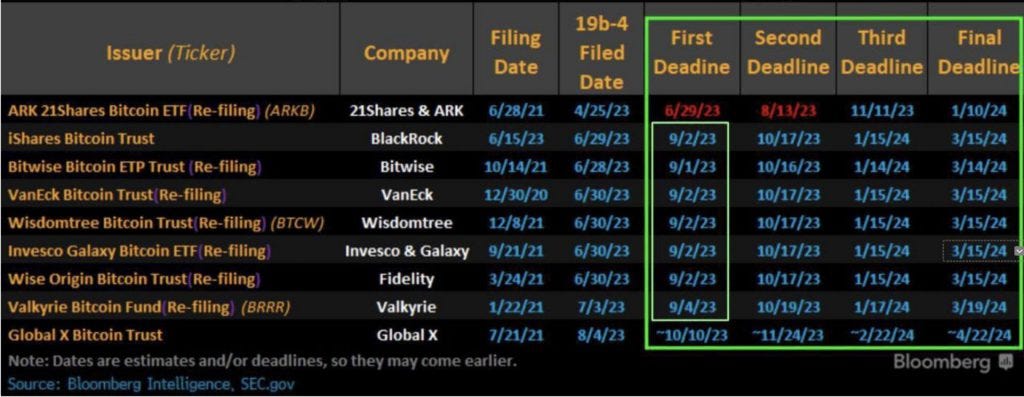Navigating the Uncertain Terrain of Bitcoin ETF Approvals: A Deep Dive
Missed SEC deadlines, Ripple lawsuit implications, and the impending BlackRock BTC ETF verdict converge, creating uncertainty and potential market shifts in the cryptocurrency realm.
The evolution of cryptocurrency continues to be punctuated by key regulatory decisions. In this context, the U.S. Securities and Exchange Commission's (SEC) handling of Bitcoin ETF applications has garnered significant attention.
Recent events—such as the missed deadlines for the 21Shares and ARK Investment's BTC ETF applications—have cast a spotlight on the regulatory landscape.
With seven more applications approaching their first deadlines, including BlackRock's, the stage is set for a crucial juncture in the cryptocurrency space.
Missed Deadlines and Rising Uncertainty
The SEC's recent misses of deadlines for the Bitcoin ETF applications by 21Shares and ARK Investment have fueled speculation and uncertainty within the crypto community.
The agency missed its initial deadline on June 29, followed by a second on August 13, for reasons that remain undisclosed. Compounding the apprehension is the SEC's authority to extend the review period for an ETF application by up to 240 days—a timeline that adds to the anticipation of a prolonged waiting game.
The Pending Countdown: BlackRock's BTC ETF Application
Amidst the backdrop of these missed deadlines, a critical moment approaches with BlackRock's BTC ETF application. BlackRock, the world's largest asset manager, is amongst the seven applications slated for decisions in the coming week.
The SEC's first deadline for BlackRock's application is imminent, set for September 2. However, the agency's recent track record of missing deadlines raises concerns about a potential pattern of delay.
As the cryptocurrency community awaits these verdicts, the specter of uncertainty looms over the industry, with possible ramifications extending well into the future.
A Regulatory Conundrum: Ripple Lawsuit Fallout
The SEC's recent legal battle with Ripple, which resulted in a partial defeat for the regulatory body, underscores the complexities it faces in navigating the crypto landscape.
The court's verdict contradicted the SEC's classification of XRP as a security, prompting questions about the agency's readiness to regulate the crypto sector.
This legal setback could be contributing to the SEC's cautious approach to BTC ETF decisions, potentially influencing the delay in reaching conclusions.
ETF Approval: Rally or Ruse?
BlackRock's entry into the BTC ETF arena initially ignited excitement within the crypto markets, reflecting mainstream recognition of the digital asset class.
However, this fervor was short-lived, as the SEC's missed deadlines injected a dose of skepticism into the equation. The potential approval of a Bitcoin ETF raises questions about market dynamics:
Will approval prompt sellers to capitalize on gains, leading to a transient price correction?
"DonAlt," a prominent crypto analyst, suggests that while an approval might trigger a rally, a subsequent retest and pullback could be in the cards.
The Path Forward: Market Watch and Uncertainty Management
As BlackRock's ETF application deadline draws nearer, the cryptocurrency world stands on the precipice of a transformative moment. The journey ahead is rife with questions and variables, including the impact of past missed deadlines on investor sentiment and decision-making.
With potential scenarios ranging from market rallies to measured corrections, the crypto community remains attuned to the regulatory developments that will shape its course.
Conclusion
The Bitcoin ETF landscape paints a vivid picture of the intricate interplay between regulatory dynamics and market sentiment. Missed deadlines, regulatory challenges, and the looming prospect of approval or denial have collectively propelled the cryptocurrency world into a state of heightened anticipation.
As industry stakeholders brace for impending decisions, the broader impact of these determinations on the cryptocurrency landscape and investor behavior remains an unfolding narrative that holds the industry's attention.




